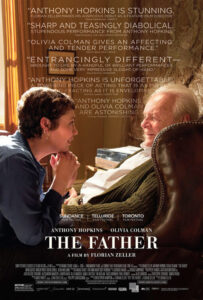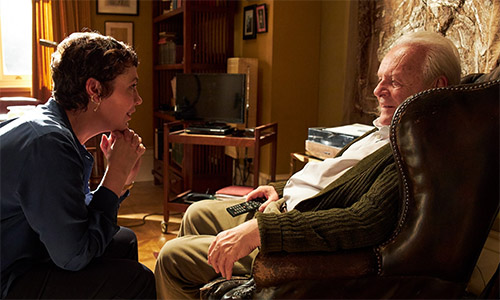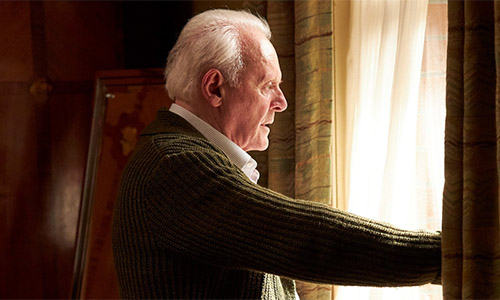 Anthony Hopkins (The Remains of the Day, Amistad) gives the second-best performance of his career (The Silence of the Lambs) in a film that fails to overwhelm, like most of the other best picture nominees. Disguised by the outstanding performances of many of the other movies nominated for Oscar’s most prominent award of the night, The Father (Florian Zeller’s directorial debut) is a very well-made film that we should remember for its story, its performances, its execution, and its all too real haunting reality. I’ll concede to that if these things meet the checklist of a Best Picture-nominated movie. But there was something while watching this highly engaging film that felt like it didn’t deserve to be a movie that was one of the eight best in any year. With that said, 2020 as a whole did not generate many great films. In that regard, The Father merits its acclaim. The counter-argument is that the Academy doesn’t have to nominate up to ten films. Before 2009, only five films were able to receive a nomination. Since then, the fewest number of Best Picture nominated films for a given year has been seven (2018). 2020 would have been a year that warranted the minimum number of selections. However, the top movies, as a whole, were so poor that it would be just as challenging to distinguish five that are that much better than eight.
Anthony Hopkins (The Remains of the Day, Amistad) gives the second-best performance of his career (The Silence of the Lambs) in a film that fails to overwhelm, like most of the other best picture nominees. Disguised by the outstanding performances of many of the other movies nominated for Oscar’s most prominent award of the night, The Father (Florian Zeller’s directorial debut) is a very well-made film that we should remember for its story, its performances, its execution, and its all too real haunting reality. I’ll concede to that if these things meet the checklist of a Best Picture-nominated movie. But there was something while watching this highly engaging film that felt like it didn’t deserve to be a movie that was one of the eight best in any year. With that said, 2020 as a whole did not generate many great films. In that regard, The Father merits its acclaim. The counter-argument is that the Academy doesn’t have to nominate up to ten films. Before 2009, only five films were able to receive a nomination. Since then, the fewest number of Best Picture nominated films for a given year has been seven (2018). 2020 would have been a year that warranted the minimum number of selections. However, the top movies, as a whole, were so poor that it would be just as challenging to distinguish five that are that much better than eight.
The Father is the scariest movie of the year. It does not fit the horror genre, though it certainly feels that way. Hopkins stars as Anthony, a man going through dementia. Though not stated, we are probably with this character for a few consecutive days. However, even this timeframe feels murky because we never truly know what is real and what isn’t (more on that later).
Anthony is far from the early stages of the disease. But he is, by no means, gone from his mind yet. He is in the midst of his battle, one minute enchanting a would-be caregiver with his wit and charm and the next wondering who the man sitting in his apartment when he comes out of his room is. We experience his disorientation as Anthony does, both through changing apartment floorplans and setups. His one constant is his adult daughter Anne (Olivia Coleman – The Favourite, Them That Follow), who has served as his primary caretaker until now. It has become apparent that she can no longer care for him in the way that he needs. The problem is that Anthony can get threatening, aggressive, and mean when he goes through one of his evil spells. It’s enough to chase off all the hired help that can even make it through meeting the unpredictable man. Couple that with Anne’s plans to move from their home city of London to Paris, where she will build on the life that she has started with a man named James. Though we hear of the plans for the first time, it’s a conversation that she and Anthony have had before. The problem is that he can only sometimes remember it. Occasionally, Anthony will even think Anne is still married to Paul (Rufus Sewell – Judy, The Holiday), her husband of ten years. To be in Anthony’s confused mind is not a pleasant place. From the start, Zeller makes it known that we are not in for the feel-good movie of 2020. Our 90-minute ride will be as hellacious for us as it might be for someone battling such a terrible, unforgiving, and dehumanizing disease.

This is the most realistic depiction of a character suffering from dementia that I’ve ever seen. Before that, it was the incredibly heartbreaking Away From Her, an extremely underrated movie that I deem to be better than The Father. Away From Her was a different kind of difficulty, however. In that film, we spent our time mainly with Grant (Gordon Pinsent) as he watched his wife Fiona (Julie Christie) succumb to the illness. We sympathize with his character so incredibly much as he watches the only woman he ever loved drift away from him mentally far before her body is ready to give in. I would challenge a viewer not to cry in that movie. I won’t give away the one particular scene that brought me to tears, but you’ll know what it is when you get there.
Other movies that are more than successful with the portrayal of the disease include Still Alice (early-onset dementia), The Iron Lady, The Notebook, and both The Savages and What They Had (two films that are mostly viewed from the perspective of adult children as they determine the best course of action for their suffering father). The Father is a different kind of cruel altogether. As an audience, we are not so far into the minds of the character experiencing the illness’s brutality as we are with Hopkins’s portrayal of Anthony.
What, at first, might feel frustrating is, in fact, the movie’s effectiveness. In cinema, we are accustomed to understanding (or at least trying to understand) plotlines and character connectivity. Zeller purposefully doesn’t allow for that. Instead, he wants us to be as confused with Anthony’s narrative as he is. The flow from one scene to the next can seem disruptive and, at times, irritating, but this becomes the film’s ultimate success. Like Anthony, we don’t know what’s real and what isn’t. At the same time, Zeller tells the story through Anthony’s eyes and the eyes of the other characters in the film. It becomes excellent editing, sequencing, and cinematography, even if it sometimes feels maddening.

To say that this is an uneasy watch would be an understatement. It’s not for everyone. It’s probably not for most people. This will hit too close to home if you have a loved one who is currently battling or has lost their fight to dementia. I am confident it will feel all too real and, perhaps, expose previous wounds, regardless of how long it has been since that experience. Likewise, if you are a little bit older and are worried about what it might be like if you lose your mind a little bit (or a lot), this isn’t the movie for you. Or if you have someone close in their life who is aging and becoming a little more forgetful or confused than you might consider normal, this could elevate those fears. The more I think about it, the more I’m not sure who this audience is for. Maybe it was made purely for independent film lovers who want something original and realistic. Perhaps it was made to try to win awards. Though it’s not a fun trip, it’s well done. From the first scene to its chilling ending, The Father is a movie that is an all too real reminder that we are all human. Regardless of how we might try to prepare for them, we will forever be susceptible to illnesses, diseases, and other unfortunate health ailments.
The Father is not a movie that deserves a Best Picture nomination but deserves to be in that next tier. Its joys are the performances of Hopkins and Coleman, each of whom earned an Oscar for their work. Each could win, though each likely will not. Hopkins’s performance is out of this world. In a different year, he may have won. He plays Anthony with such purpose, showcasing the depths and torment that dementia can bring. This year, the award will go to Chadwick Boseman (Ma Rainey’s Black Bottom). Coleman meets Hopkins scene for scene, exhibiting the misery a loved one must experience while also feeling the need to mask so many of their feelings so that the sick person doesn’t become agitated, disoriented, or disrupted by what feels like everyday life.
Plot 8/10
Character Development 9.5/10
Character Chemistry 8/10
Acting 10/10
Screenplay 8.5/10
Directing 9.5/10
Cinematography 9.5/10
Sound 9/10
Hook and Reel 8/10
Universal Relevance 10/10
90%
A-
Movies You Might Like If You Liked This Movie
- Away From Her
- Amour
- Still Alice
- The Savages
- Sound of Metal